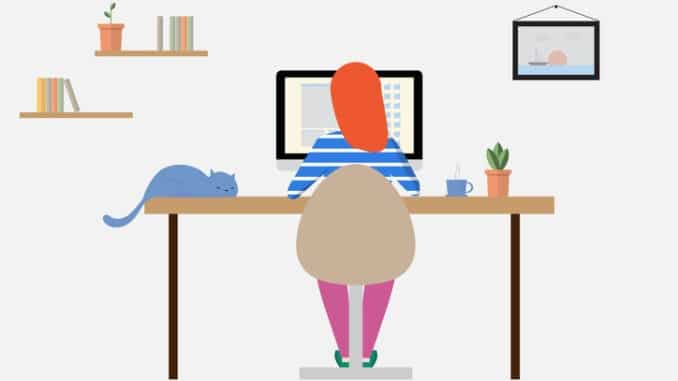
Adjusting to a new working environment can be tricky, especially when the boundaries between our personal and professional spaces might become blurred – but with this simple five-step guide by Fiona Thomas, you can quickly rise to the challenge
CREDIT: This is an edited version of an article that originally appeared on Happiful
Personally, I love the WFH perks (lunchtime Netflix anyone?) but there’s no denying it’s taken a few years to figure out my working style, so don’t feel bad if you’re still figuring it all out. From puzzling Zoom etiquette and missing the office atmosphere, to mastering loungewear chic and remembering to take breaks, it’s a whole new world. There are lots of ways you can make this shift a positive one, with some guidance from yours truly…
Be sure to separate your work and home life
The concept of boundaries can often feel a bit vague, especially when you spend all your time within the same four walls – but firm boundaries rarely exist without conscious effort, so think about putting some in place for your own sake. Try going for a short walk before and after work to simulate your commute, while keeping your ‘phone on airplane mode to prevent unwanted emails or calls.
Having an end-of-the-day routine can also help send the signal to your brain that work has finished. Something as simple as dimming the lights, or changing into comfy clothes, can act as the metaphorical door closing on your work responsibilities. Carving out social time with friends is equally as important, so why not keep your lunch hour sacred by arranging a virtual coffee with one of your besties?
Rethink productivity
As a self-confessed workaholic, I know how easy it can be to link productivity to my sense of self-worth. While you might, technically, have fewer distractions and more spare time, psychotherapist Paula Coles says that she has observed clients experiencing “fatigue, boredom and hopelessness” related to their new, enforced circumstances. This means you might find it hard to concentrate for long periods, which can result in frustration when you recall how you used to perform at work.
Understand that your mind is being subjected to a prolonged period of mental stress, so all those comparisons you’re making to your pre-pandemic self – they’re not helpful. Instead, try to reframe basic self-care – sleep, movement, food, water, regular breaks – as precursors to productivity. Planting these seeds of nourishment will give you a better chance of meeting your work goals.
Communicate
Don’t be afraid to set clear expectations around deadlines and your office hours; just because someone sends you an email at 10pm doesn’t mean you’re required to reply to it. Responding to late-night emails sets a precedent that you’re okay with this, so let your actions do the talking and, if you’re struggling with your workload, remember your boss isn’t a mind-reader. Working remotely means they might not be able to pick up on the fact you’re more stressed or tired than usual, so you may need to make a conscious effort to vocalise these issues.
Regain control
“Psychology tells us that one of the most stressful things we can experience is ‘learned helplessness’ where we don’t feel we have power, control, or a sense of agency in our lives,” says psychotherapist Paula. “Many people working from home now didn’t actively choose it, so we must try to develop a stronger positive internal locus of control by thinking about what you do have control over.”
When it feels like a difficult way of life has been forced upon you, challenge yourself to take back your days by creating a gentle routine that plays to your strengths. Do you need quiet time in the morning? Get up early and enjoy a peaceful cuppa. Do you feel overwhelmed when it’s time to clock off? Make a to-do list for the next day – and perhaps you can make the most of the flexibility at home to squeeze in a yoga session on your lunch break?
Finally, don’t feel bad if you are enjoying this time at home. “Many of my clients are relieved to not have long commutes, or the pressure of negotiating workplace politics and social dynamics,” says Paula. “Some have even been hugely proactive and have completely reconsidered their careers – something they never had the headspace to do before the pandemic.”
Bonus tips
Choose wisely. The more decisions we have to make, the harder they become. It’s tempting to address the simple stuff first, but you’ll make life easier if you address the bigger dilemmas early on.
Maximise your down-time. Utilise being home to crack through your chores. Put a load of washing on before you start work and, when it’s ready, it can be a signal to look away from your screen break and move around.
Ignite those creative sparks. You’ll be astounded at what a change of scenery can do for your mindset. Move away from your desk and see how a change of location helps you get creative or problem-solve.


Be the first to comment